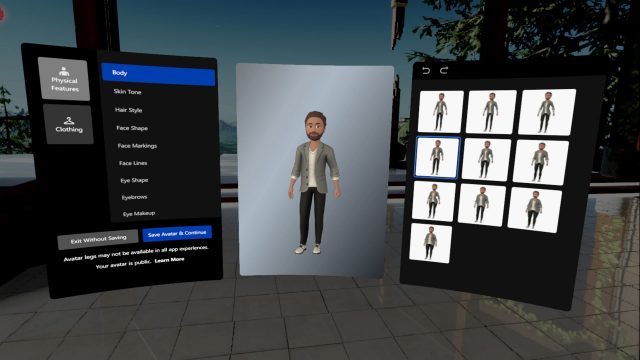Facebook is rolling out its latest avatars, Oculus Avatars 2.0, which it hopes will finally unify virtual identify across Oculus applications and Facebook products. In addition to becoming the default avatars for Facebook Horizon and being optionally integrated into Oculus games, Facebook also teased that the new avatars will eventually find their way to the Facebook app, Messenger, Instagram, and more.
Facebook has begun rolling out its latest avatars which bring a major update to both visuals and motion over the previous avatars.
Given that a VR headset and controllers only tell the computer the location of your head and hands, it’s quite difficult to accurately predict where the rest of your body (like your elbows and shoulders) should be shown in the virtual world. Facebook says it has leaned on new methods based on machine-learning to create more believable and expressive avatar movements based solely on the movement of your head and hands.
Facebook says Avatars 2.0 offers far more customization than the previous system, now allowing users to individually customize skin tone, hair style, face shape/markings/lines, eye shape, eyebrows, eye makeup, and more. Combined with other options like clothing, glasses, and body types, the company says there’s more than one quintillion possible combinations of avatars.
While anyone running the latest version of the Oculus Quest software should be able to customize an avatar with the new system, it’ll be some time yet before they can be widely integrated into Oculus applications; Facebook is only offering the new system to select developers for the time being, with open access to the Avatars 2.0 SDK planned for “later this year.”
Three applications now support the Oculus Avatars 2.0 right out of the gate: Epic Roller Coasters, PokerStars VR, and Topgolf with Pro Putt. Facebook says that the new avatars will also soon show up in Synth Riders and ForeVR Bowling.
As for Facebook’s own VR products, the company says that later this year Oculus Avatars 2.0 will replace the avatars in Facebook Horizon, the company’s social VR app which remains in closed beta. Outside of VR, the company has also teased that Avatars 2.0 will come—in some form—to the Facebook app, Messenger, Instagram, and other, unspecified, Facebook products.


